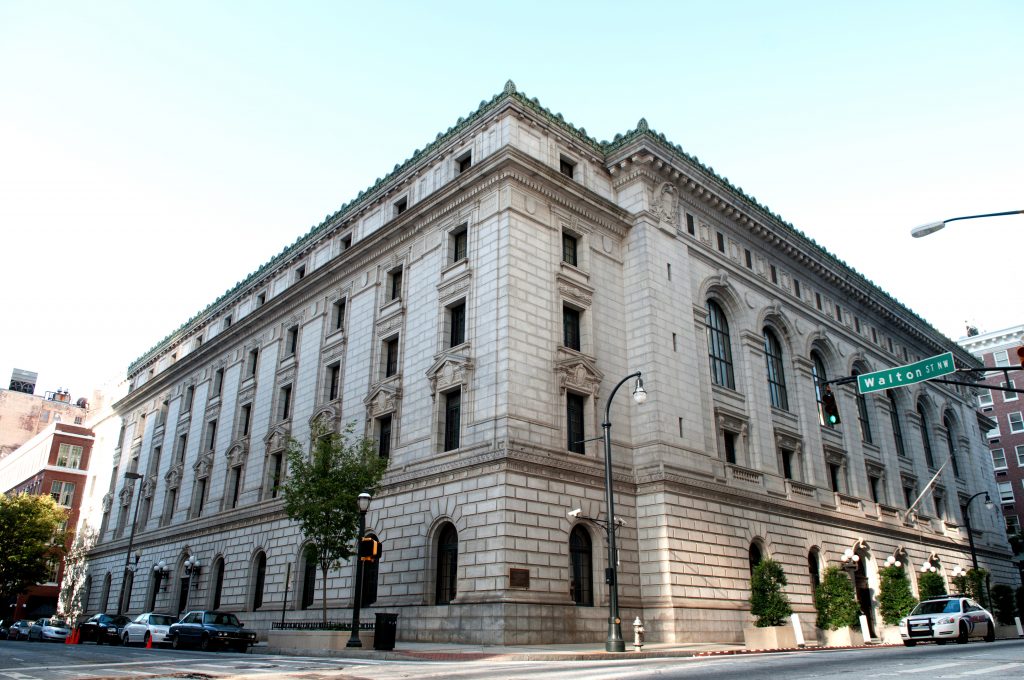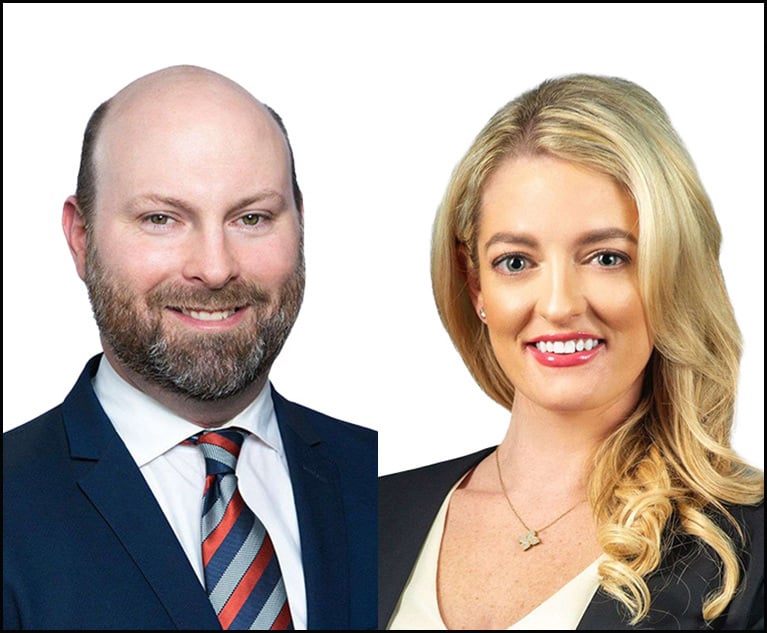'Red Herring' Distracts Federal Court in International Dispute Over Blueberry Prices
The appellate panel held the district court abused its discretion by deciding jurisdiction, without properly weighing all the factors before granting a motion to dismiss based on forum non conveniens.
April 24, 2019 at 05:54 PM
5 minute read
 Elbert P. Tuttle U.S. Court of Appeals Building, Atlanta, Georgia. Photo by Rebecca Breyer.
Elbert P. Tuttle U.S. Court of Appeals Building, Atlanta, Georgia. Photo by Rebecca Breyer.
An appeals court ruled a South Florida federal judge was misled by a red herring in an international case concerning blueberry prices.
The U.S. Court of Appeals for the 11th Circuit Monday found the district court erroneously dismissed the case in part because there's no agreement between the U.S. and the Netherlands, where the dispute originated, for enforcing court-ordered judgments.
The appellate panel vacated U.S. District Judge Beth Bloom's dismissal of Fresh Results v. ASF Holland B.V. in the Southern District of Florida.
In the underlying case, the plaintiff, Delaware produce company Fresh Results, sued Netherlands-based distribution company ASF Holland over “a blueberry deal that soured,” according to the appellate court's order.
“[Fresh Results] alleged that ASF Holland fraudulently promised a high reference price but then deflated the actual price it paid by sending false reports,” the opinion said. “According to Fresh Results, ASF Holland manipulated the price by understating the amount paid by its European customers and by falsely inflating its expenses in the reports.”
Circuit Judge William Pryor authored Monday's order, which remanded the case for further proceedings. The order found the lower court had abused its discretion by deciding jurisdiction, without properly weighing all the factors before granting ASF Holland's motion to dismiss based on forum non conveniens.
Bloom had found Dutch law would likely apply to the disputes in the case, and that Dutch courts were therefore best suited to apply that law.
But Fresh Results felt otherwise. It appealed, and the 11th Circuit panel agreed.
“After concluding that the interests of the litigants—the so-called 'private factors'—were not in equipoise, the district court ruled that it need not consider all relevant 'public factors' for each forum and dismissed the complaint so that the litigation could proceed in the Netherlands,” Pryor wrote.
The opinion found that in weighing a case's proper venue, courts must consider the advantages and disadvantages of the distinct forums by evaluating their respective private and public factors.
Read the 11th Circuit's order:
“The private factors 'pertain to the interests of the participants in the litigation,' ” Pryor wrote, adding “the relative ease of access to sources of proof,” and the “availability of compulsory process for attendance of unwilling, and the cost of obtaining attendance of willing, witnesses,” qualify as private factors. The appellate court also cited prior rulings that referred to public factors as the consideration of “the 'local interest in having localized controversies decided at home,' ” as well as “the avoidance of unnecessary problems in conflicts of laws.”
The appellate panel held that the district court's finding inappropriately used an equipoise standard to determine the public factors did not require the examination afforded to the private factors, in turn justifying the case's dismissal. Monday's ruling offered a rebuttal to precedent regarding the use of the standard when determining a lawsuit's correct venue.
“ Our rejection of the equipoise standard means that a district court may not bypass the public factors, even when the private factors are not at or near equipoise,” the order said. “We vacate the dismissal of the complaint and remand for the district court to consider all relevant private and public factors.”
The appellate ruling found the lower court had erred in its analysis of the private factors and must correct them on remand. The judge contended Bloom's order disregarded the testimony of South American blueberry growers who were willing to testify in the U.S., and not in the Netherlands, because “the growers are not parties to this lawsuit.” It found that while the district court may find “the importance of the growers' testimony is insubstantial compared to the location of other sources of proof accessible in the Netherlands,” it “cannot categorically disregard their testimony solely because they are non-parties.”
Monday's order found the district court's decision ”was distracted by a red herring.”
“It reasoned that the enforceability of a possible judgment favored dismissal because no treaty exists between the United States and the Netherlands that governs the reciprocal enforcement of judgments,” Pryor wrote. “Relying solely on the absence of a treaty—when no such treaty exists for the United States—was an erroneous basis to weigh this factor in favor of dismissal.”
The court declined to rule on whether the U.S. or the Netherlands was the more appropriate venue for the lawsuit.
DLA Piper lawyers Christopher Oprison and Ardith Bronson represented ASF Holland, alongside Boca Raton litigator Marc Nurik. Requests for comment from the attorneys were not returned by press time.
An attorney with Fresh Results' legal team, West Palm Beach lawyer Scott Atherton, said the group was “grateful” the court clarified the controlling standards for motions on proper forum disputes in the 11th Circuit.
Atherton added, “We look forward to proceeding with our case pursuant to those standards in the trial court.”
Related stories:
11th Circuit Reaffirms $6.3M Godiva Settlement Over Credit Card Info Printed on Receipts
Forum Non Conveniens: A Vehicle for Sending Foreign Litigants Back Where They Belong
This content has been archived. It is available through our partners, LexisNexis® and Bloomberg Law.
To view this content, please continue to their sites.
Not a Lexis Subscriber?
Subscribe Now
Not a Bloomberg Law Subscriber?
Subscribe Now
NOT FOR REPRINT
© 2025 ALM Global, LLC, All Rights Reserved. Request academic re-use from www.copyright.com. All other uses, submit a request to [email protected]. For more information visit Asset & Logo Licensing.
You Might Like
View All

U.S. Eleventh Circuit Remands Helms-Burton Trafficking Case Involving Confiscated Cuban Port
3 minute read
Blank Rome Adds 4 From Akerman in Second 2024 White Collar Group Hire
4 minute read
Florida Ports Get Cargo Traffic Boost, See Cruise Rebound
Trending Stories
- 1Thursday Newspaper
- 2Public Notices/Calendars
- 3Judicial Ethics Opinion 24-117
- 4Rejuvenation of a Sharp Employer Non-Compete Tool: Delaware Supreme Court Reinvigorates the Employee Choice Doctrine
- 5Mastering Litigation in New York’s Commercial Division Part V, Leave It to the Experts: Expert Discovery in the New York Commercial Division
Who Got The Work
J. Brugh Lower of Gibbons has entered an appearance for industrial equipment supplier Devco Corporation in a pending trademark infringement lawsuit. The suit, accusing the defendant of selling knock-off Graco products, was filed Dec. 18 in New Jersey District Court by Rivkin Radler on behalf of Graco Inc. and Graco Minnesota. The case, assigned to U.S. District Judge Zahid N. Quraishi, is 3:24-cv-11294, Graco Inc. et al v. Devco Corporation.
Who Got The Work
Rebecca Maller-Stein and Kent A. Yalowitz of Arnold & Porter Kaye Scholer have entered their appearances for Hanaco Venture Capital and its executives, Lior Prosor and David Frankel, in a pending securities lawsuit. The action, filed on Dec. 24 in New York Southern District Court by Zell, Aron & Co. on behalf of Goldeneye Advisors, accuses the defendants of negligently and fraudulently managing the plaintiff's $1 million investment. The case, assigned to U.S. District Judge Vernon S. Broderick, is 1:24-cv-09918, Goldeneye Advisors, LLC v. Hanaco Venture Capital, Ltd. et al.
Who Got The Work
Attorneys from A&O Shearman has stepped in as defense counsel for Toronto-Dominion Bank and other defendants in a pending securities class action. The suit, filed Dec. 11 in New York Southern District Court by Bleichmar Fonti & Auld, accuses the defendants of concealing the bank's 'pervasive' deficiencies in regards to its compliance with the Bank Secrecy Act and the quality of its anti-money laundering controls. The case, assigned to U.S. District Judge Arun Subramanian, is 1:24-cv-09445, Gonzalez v. The Toronto-Dominion Bank et al.
Who Got The Work
Crown Castle International, a Pennsylvania company providing shared communications infrastructure, has turned to Luke D. Wolf of Gordon Rees Scully Mansukhani to fend off a pending breach-of-contract lawsuit. The court action, filed Nov. 25 in Michigan Eastern District Court by Hooper Hathaway PC on behalf of The Town Residences LLC, accuses Crown Castle of failing to transfer approximately $30,000 in utility payments from T-Mobile in breach of a roof-top lease and assignment agreement. The case, assigned to U.S. District Judge Susan K. Declercq, is 2:24-cv-13131, The Town Residences LLC v. T-Mobile US, Inc. et al.
Who Got The Work
Wilfred P. Coronato and Daniel M. Schwartz of McCarter & English have stepped in as defense counsel to Electrolux Home Products Inc. in a pending product liability lawsuit. The court action, filed Nov. 26 in New York Eastern District Court by Poulos Lopiccolo PC and Nagel Rice LLP on behalf of David Stern, alleges that the defendant's refrigerators’ drawers and shelving repeatedly break and fall apart within months after purchase. The case, assigned to U.S. District Judge Joan M. Azrack, is 2:24-cv-08204, Stern v. Electrolux Home Products, Inc.
Featured Firms
Law Offices of Gary Martin Hays & Associates, P.C.
(470) 294-1674
Law Offices of Mark E. Salomone
(857) 444-6468
Smith & Hassler
(713) 739-1250






